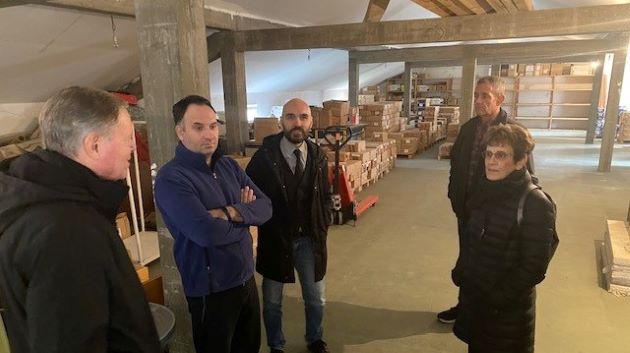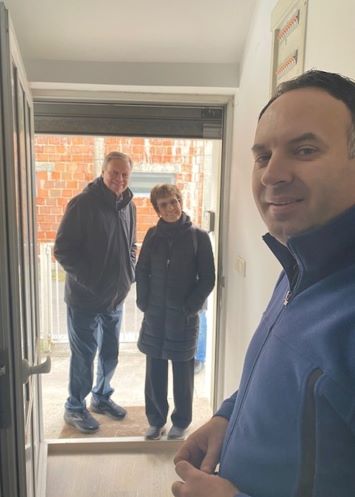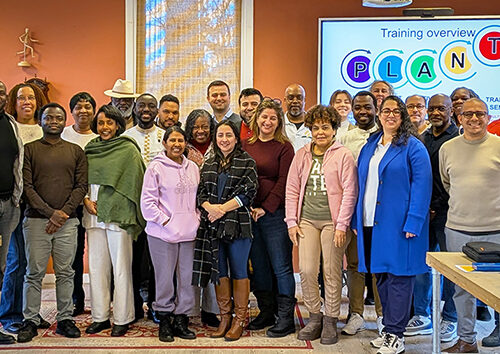06 December |BeIgrade, Serbia [Igor Mitrović with tedNEWS]
We are standing outside a large building in a mainly sub-urban housing area of north-east Belgrade, which includes homes for almost 10,000 from the Roma community, and some from the Syrian and Ukraine communities. “We are here for their kids – to prepare them to enter secondary school,” says Serbian Adventist Development and Relief Agency (ADRA) director, Igor Mitrović. The building owned by the church is currently undergoing renovation for use as a Centre of Influence. “Once finished” continues Mitrović, “we want to paint it, we want it to be attractive, so it won’t simply be a house, but a building which will stand out – possibly with some street art – to indicate something special.”
Sunday Morning Classes for Roma Children
Once complete the building will house a church congregation with some apartments for key workers, but most of the space will be for ministry. “Currently”, says Mitrović, “we have Roma refugee children taking Sunday morning classes to improve their education, so that we can help integrate Roma children into schools. This is a long term ADRA Serbia project – committed for years and if necessary, decades, to help solve generational issues that affect communities.
The local onsite ADRA worker logistician and church member is Pavle Radovanov, the co-ordinator for all activities taking place at the centre. “It’s not just the formal education classes we run, but also informal activities with the children which includes teaching essential life skills. When they go home from here (if we can call their settlement ‘home’), they are in their group, where they face many risk factors – smoking, drugs and alcohol consumption, so we try to motivate them to avoid as far as possible.”
Even prior to the new centre being fully open, up to 35 children meet spread over three sessions. “Working with three Roma Settlements”, Radovanov continued, “we prepare children to enter secondary school, and encourage the children to follow right through the secondary school process, because there is a high risk of drop out.”
Primary school is a safe place, an environment the children are used to, but as Pavle explains, “They are not motivated to go on to secondary school because of the many challenges such as large class sizes, and the biggest wall of all to face – the problem of language.
“Nobody else in Serbia is doing anything like this”.
Elsewhere in the building there is a plan for an IT working space for young aspirational youth to connect and share with their skill set and create working teams, and even business ventures. Integrated through this is the plan for an on-site youth church to provide spiritual nurture and care. “But don’t forget this point”, says Radovanov, nobody else in Serbia is doing anything like this”.

Listening to Radovanov explain about the Centre of Influence ‘work in progress’ are Mark and Teenie Finley making a site visit, clearly energised and enthusiastic about the potential of this growing ministry, Radovanov went on to share how he was baptised because of Finley’s 1988 mission to Belgrade. Clearly delighted, the Finley’s beamed recognising how the Lord moves and stirs in ways unimaginable from a human perspective.

Impressed about the potential for this centre of influence, Finley encouraged Radovanov by explaining the power of godly vision:
“Vision is the anointing of God,
so you see before others see,
you see what others do not see,
you see beyond what others see,
believing that God is going to accomplish that in your life.
It is through the vision of ADRA Serbia, working together with the church and other supporting agencies which provides an opportunity to break the cycle of generational poverty, victims of economic, political and social policies of governments across continents, and not forgetting wars.
Elaborating further on what Pavle shared, Igor Mitrović explained further the challenge of children not progressing further into high school education:
- Their language is not Serbian, so they have the language barrier to follow what the teacher is saying.
- At home they have no one to help them with the homework. No supportive learning environment. With parents who are illiterate, how can the parents possibly help?
- The critical point is when 45% of children drop out between 4th and 5th Up to 4th grade is it compulsory for teachers to give a passing grade. On enrolment into 5th grade with poor background and knowledge base, they start receiving F grades. The children are so embarrassed, that they drop out.
The Focus of our Work
“It is at this point our work is focussed”, says Mitrovic, “to come alongside these children and bridge the gap they need to stay in education, to successfully pass on to the next level, with as good a performance as possible. And then if we are successful”, hoped Mitrovic, “In the last school year our plan is to link them with potential employers to provide apprenticeships. At the heart of all this effort, is a heart for a child we have travelled on a journey with him/her to get them to the point where they are ready for employment.
Travelling back to Belgrade city centre in the car, and after being shown a local Roma settlement, we collectively wondered, what if we had to live there? What if tonight I had to go home to a prefabricated dwelling, with gaps between the wall and the roof? While we knew that we could not solve all the problems of the world in relation to poverty, we determined to do what we should and we can, but also with a sense of gratitude to see ADRA and the wider church working together – a major step forward.



